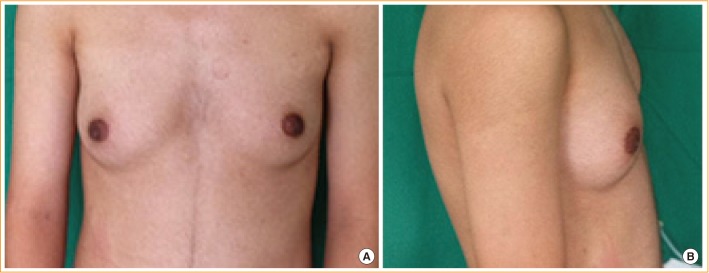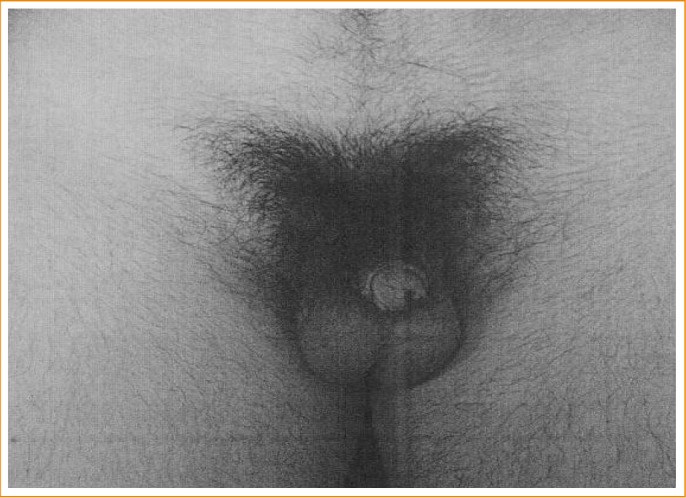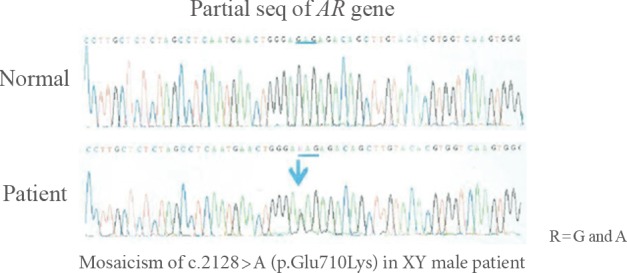Endocrinol Metab.
2015 Jun;30(2):226-230. 10.3803/EnM.2015.30.2.226.
Partial Androgen Insensitivity Syndrome Presenting with Gynecomastia
- Affiliations
-
- 1Department of Internal Medicine, Hanyang University College of Medicine, Seoul, Korea. ahnyh@hanyang.ac.kr
- KMID: 2282015
- DOI: http://doi.org/10.3803/EnM.2015.30.2.226
Abstract
- Gynecomastia is a benign enlargement of the male breast caused by the proliferation of glandular breast tissue. Determining the various causes of gynecomastia such as physiological causes, drugs, systemic diseases, and endocrine disorders is important. Androgen insensitivity syndrome (AIS) is a rare endocrine disorder presenting with gynecomastia and is a disorder of male sexual differentiation caused by mutations within the androgen receptor gene. All individuals with AIS have the 46 XY karyotype, although AIS phenotypes can be classified as mild, partial or complete and can differ among both males and females including ambiguous genitalia or infertility in males. We experienced a case of partial AIS presenting with gynecomastia and identified the androgen receptor gene mutation.
MeSH Terms
Figure
Reference
-
1. Eckman A, Dobs A. Drug-induced gynecomastia. Expert Opin Drug Saf. 2008; 7:691–702. PMID: 18983216.
Article2. Mathur R, Braunstein GD. Gynecomastia: pathomechanisms and treatment strategies. Horm Res. 1997; 48:95–102. PMID: 11546925.
Article3. Kee CS, Park DI, Lee OY, Han DS, Son JH, Yoon BC, Ahn YH, Ham JS, Lee MH, Park KN. Gynecomastia in patients with cirrhosis. Korean J Gastroenterol. 1994; 26:842–849.4. Sung KJ, Lee MW, Choi JH, Koh JK, Park SK. The frequency of the cutaneous problems and the influence of hemodialysis in patients with chronic renal failure. Korean J Dermatol. 1991; 29:313–321.5. Cho HJ, Yang S, Oh PS, Shin JH. A case of sertoli cell tumor presented with sexual precosity. J Korean Soc Pediatr Endocrinol. 2004; 9:86–90.6. Braunstein GD. Clinical practice. Gynecomastia. N Engl J Med. 2007; 357:1229–1237. PMID: 17881754.7. Melo KF, Mendonca BB, Billerbeck AE, Costa EM, Inacio M, Silva FA, Leal AM, Latronico AC, Arnhold IJ. Clinical, hormonal, behavioral, and genetic characteristics of androgen insensitivity syndrome in a Brazilian cohort: five novel mutations in the androgen receptor gene. J Clin Endocrinol Metab. 2003; 88:3241–3250. PMID: 12843171.
Article8. Quigley CA, De Bellis A, Marschke KB, el-Awady MK, Wilson EM, French FS. Androgen receptor defects: historical, clinical, and molecular perspectives. Endocr Rev. 1995; 16:271–321. PMID: 7671849.
Article9. Ahmed SF, Khwaja O, Hughes IA. The role of a clinical score in the assessment of ambiguous genitalia. BJU Int. 2000; 85:120–124. PMID: 10619959.
Article10. Gottlieb B, Beitel LK, Nadarajah A, Paliouras M, Trifiro M. The androgen receptor gene mutations database: 2012 update. Hum Mutat. 2012; 33:887–894. PMID: 22334387.
Article11. Park SY, Choi YM, Park SH, Yang SW, Ku SY, Kim SH, Kim SW, Paik JS, Yang DH, Choi DS, Kwon HC, Choi DH, Lee SH. Analysis of androgen receptor gene in Korean patients with androgen insensitivity syndrome. Korean J Obstet Gynecol. 2001; 44:655–662.12. Georget V, Bourguet W, Lumbroso S, Makni S, Sultan C, Nicolas JC. Glutamic acid 709 substitutions highlight the importance of the interaction between androgen receptor helices H3 and H12 for androgen and antiandrogen actions. Mol Endocrinol. 2006; 20:724–734. PMID: 16373394.
Article13. Alvarez NR, Lee TM, Solorzano CC. Complete androgen insensitivity syndrome: the role of the endocrine surgeon. Am Surg. 2005; 71:241–243. PMID: 15869141.
Article
- Full Text Links
- Actions
-
Cited
- CITED
-
- Close
- Share
- Similar articles
-
- A Case of Laparoscopic Gonadectomy in Complete Androgen Insensitivity Syndrome
- A Case of Complete Androgen Insensitivity Syndrome with Bilateral Inguinal Gonads
- A Case Report of Complete Androgen Insensitivity Syndrome
- Familial androgen insensitivity syndrome detected in four siblings in a family
- Pelviscopic Gonadectomy in two cases of Complete Androgen Insensitivity Syndrome




